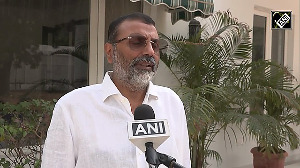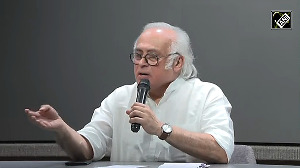In 1947, when India became independent, it found itself short of practically every kind of talent and skill. And such was the call of nationalism that droves of young men joined the government to, as they hoped, serve the country. Samar Sen, who passed away on Wednesday, was one of them.
Had he remained outside government he would have been one of India's best-known economists. He had specialised in agricultural economics; and in those days there weren't many of them.
But like so many others -- Tarlochan Singh, Pitambar Pant, I G Patel, R M Honaver, Sharad Marathe, to name a few -- he chose real work instead of the puffery, posturing and politicking that now passes for economics.
Asked whether he would not like to write books and articles in newspapers, he said he would leave that to the actors and be content with writing the script.
Dr Sen wrote many scripts. There was hardly any economic policy from 1948 to 1969, when he left for the World Bank as India's executive director, that did not pass through him. Whether in the ministry of agriculture or later in the Planning Commission, his voice was heard.
He was one of the few to whom so many owed so much, including the shooting down of a free trade proposal from the Americans in 1948. It had come to Jawaharlal Nehru who marked it to him so that he could be properly advised about its implications.
Had we accepted that proposal, Dr Sen said, we would have passed seamlessly from one bondage to another. The Americans had a lot of excess capacity after the war and wanted India's raw materials on the cheap so that they could sell to the Europeans who would pay with Marshall Plan money.
The main difference between then and now, he said a few years ago, was that then the government listened to the experts. Now it is the other way round. It was Indira Gandhi who wrought this change.
Mercifully, he was away in Washington during the 1970s and retired in 1978. So, except for 1966-69, he didn't have to work for any of her governments.
But even though he did not approve of her methods, he was broadly in sympathy with her objectives. And, after reforms began in 1991, he certainly didn't think highly of the way India was integrating into the world economy.
Getting a greater share of the world economic cake is one thing, he maintained, but handing over your economic freedoms to foreigners is quite another.
During the 1980s, he served on the board of the Reserve Bank of India and many of its committees. He warned against the RBI taking over the note counters, who now constitute 65 per cent of its employees.
He was also the chairman of the RBI committee entrusted with the task of finding out how best to take the Green Revolution east.
It is a very prescient document. Its most important warning, unheeded, was that by the middle of the 1990s, all the benefits deriving from the post-Independence drive to consolidate land holdings would dry up.
He persuaded the Committee to put in a paragraph saying that India needed to modify its inheritance laws. But that was too hot a potato to even be discussed.
In the late 1980s, he was a member of the Sarkaria Commission on Centre-state relations. Although Dr Sen had worked throughout at the Centre, he was instinctively sympathetic to the states.
Even when he knew that some of them were led by rogues and rascals, he would be inclined to give them the benefit of doubt. The power relationship is too asymmetric, he said, for a proper federal relationship to be formed.
Back in 1988, when the idea that India could achieve a sustained 8 per cent growth was first mooted, he was asked if it made any sense. Most people, he replied, think resources will be a problem but the real problem is different. It is the ability of politicians to lead sensibly.
Both his sons now work in the Planning Commission. The elder has just become a member. It will be interesting to see how sensibly their political masters lead them.






 © 2025
© 2025